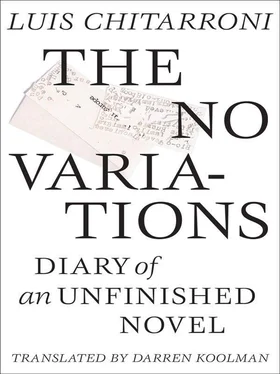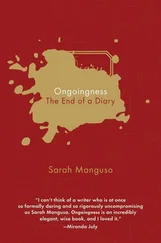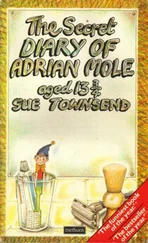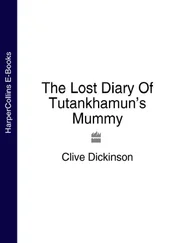Time to decide on our own, true name for Dos, a.k.a. Delfín Ambrosio Hurtado Iriondo. A transcription of the process. The minutes from some kind of rite or ceremony of initiation:
The Quintain
The … have a look in Chatwin and Pessoa
The Invunche
The manipanso / maniputo / African fetish
The Go-Between ( er ?)
Committee members present: Elena, Nicasio, Belisario.
And once you’ve come up with a good name: sell the rest, settle for the leftovers.
Parsnip & Pimpernel (Waugh): Auden & Isherwood.
Central committee, without Nicasio. “Sircular Cymmetry.” Liturgical glossary. Lycergical glossary. The noise of many glossaries
The journey. List
Cheap Penguin edition: The Virgin and the Gypsy . The cover of La Mujer y la bestia .
Passive apnea: Monitor / Merrimac.
The passive voice, using “one” as a third-person pronoun.
What goes around comes around / Snowball.
The story of my friends visiting the dying Virgilio Piñera. Modest porteño scene of a man sitting at his desk writing, a scene very much like the one in that Kubrick film where a Marcos Zucker lookalike (Krapp?) is writing a book with the same title as the movie (or, anyway, the book on which the movie is based). With an Angolan nurse (male). Disease located right there. The comment: “What goes around comes around.” The lumbar religion (Nurlihrt dixit ).
Sluglike. Non-peristaltic virgin.
A pinnacle of elegance vs. the Mamarracho.
First catalogue of stories (written and partially written):
Early
The Imitation of an Ounce
The Scent of Thunbergias
America (The Fasting of Lourdes?)
Occupation (after Henry James)
Returns
The Old Bachelor
Semblance
Replicas
The Xochimilco Diary
Out of a Greek Gift
Did he Reach Thirteen?
Arriving Late
After Ibiza, we lived in Barcelona, where Elena had family. Hoards of cousins — both the docile and delinquent kinds. Mansions with outdoor swimming pools, omniscient beggars in the Gothic Quarter. Our short visit to Pere Ausic, a distant relative, who signed his name Zeuxis, posing not only as a sodomite but a sculptor (though his strong point was drawing), delighting in trivial cryptograms and impenetrable repentismos —songs with improvised lyrics. It was hard following him, but afterward, we were able to repeat a few of the things he’d come out with: something (a fib) about the Catalan painter Ramón Casas, and something else (a bon mot) about Sunyer. We didn’t stay long, with our responsibilities moored like sailors at a riverbank, growing impatient; the sea beckoning them.
We went to Madrid alone, leaving our friendship with Eduardo Manjares behind. We visited an antique store and “ran into that specimen of graying Spaniard who knows a lot about diving suits,” said Elena, “and who was asking us about books by some Argentine pornographer we’d never heard of.” This anecdote always ended with us back at home, faced by Dos’s wide, disbelieving eyes, and/or skeptically amused expression, after which he would proceed to explain the relationship between the pornographer in question and his avuncular herald [brother of the father of the protagonist-narrators in “Replicas”].
When we arrived in London, following Sebastian Birt’s handwritten guide, it didn’t take us long to realize we were lost.
Nicasio Urlihrt, Diary
“Dead Aunt’s Diary” in “Out of a Greek Gift”?
A woman with her feet freighted in a new pair of shoes, growing impatient, the nails of a nautical excuse chewed away. Fingernails, that is.
To go unnoticed, as Aira once was; like Pizarnik; like Raúl Gustavo Aguirre.
Three intersecting diaries: the dead aunt’s (Inés?), Nicasio’s, and Xochimilco’s (Prosan, Luini?)
The story by??? In the “detective magazine” with the mask …?
Black Mask . Haggard.
Elena / Teodelina
They were so alike that seeing them together compelled people to spout similes as well as point out the differences between them. Mere shades, nuances. Today’s jasmines compared with those of days before.
Nurlihrt, a professional, had photographed them while they were asleep. They posed before the incubus, each with the same expression of docile acquiescence.
Do away with similes, as Flaubert wanted (this is in the letters, Louise Colet, look up)
Stendhal in Muse and Thinker .
Voices
Dress rehearsal
(baton, throat-clearing)
Agraphia / Alusiva , a journal founded by Nicasio Urlihrt (Emilio Mario Teischer) and his wife, Elena Siesta, with anonymous — or at the most, acronymous — contributors, to publish the best literature (statement of purpose rather than fact) according to the couple’s own criteria. Their penchant for pseudonyms, which an essay in the first issue would account for with the phrase ad usum Delphini —in other words, for the education and diversion of the young, with an eye toward use in institutions of higher learning — was a [judicious] challenge issued to their era, as well as a source of wildfire gossip (with its usual roll call of the relevant phantoms, quotations, and parenthetical remarks). Urlihrt adduced a controversial synthesis of Giordano Bruno and Giambattista Vico to exculpate the culprits [and conspirators], and, at the same time, to demonstrate that creation and corruption are the same thing. From the middle of the last century to the beginning of this, Agraphia / Alusiva was, by and large, the leading exemplar, epitome, and promulgator of this bogus proclamation.
Agraphia / Alusiva , a journal founded by Nicasio Urlihrt (Emilio Teischer) and his wife, Amanda Corelli Estrugamou (Elena Siesta), intended to be entirely anonymous. It was to publish only the best literature, at least according to the couple’s criteria. Their preference was for the use of pseudonyms — a legitimate reflection of their era’s zeitgeist (and the cause of wildfire gossip once word got out), but a flimsy screen when subjected to serious critical scrutiny today. The contributors were known for — or ignored thanks to — the heresy they’d committed, and of which they took every opportunity to boast, even calling themselves “the writers without stories.” They went around publishing books espousing the theory that it’s better to simply write stories than to write about the writing of stories, and to illustrate this, they simply wrote stories. Few readers remember those stories today, but many recall the anecdotes associated with [adjacent to?] them. [Such that] Forgetting is not so serious an affront as long as we remember what it is we’ve forgotten. If it were [it was?] ever to become necessary to exonerate [the coterie, the conspirators], Nurlihrt would just publish a series of [unsigned] editorials to adduce a controversial synthesis of two seemingly incompatible theses, and at the same time, [to] proclaim that generation and corruption are one and the same. From the middle of the last century to the beginning of this, Agraphia / Alusiva was the evangelizing force behind this and other forms of casuistry.
Eiralis the Prologist, at arms:
Mar del Plata, 23 April, 1899 [sic]
Dear D. Julio,
Now that you’ve explained “the project,” I’m less inclined than before to accept “the commission”—please excuse the scare quotes, but in this case I feel they are entirely necessary. I know that some of your best friends would, if having this conversation aloud, take the opportunity to pinch vulgarly at the air with their forefingers as they spoke, to make their disdain for such terms as evident as possible.
Of course I’ve heard of Agraphia ; I’ve even had the dubious honor of being invited to work with the people “behind Agraphia ,” and the pleasure (although I didn’t tell them it was so) of declining their invitation — a piece of information you should keep to yourself (like a whisper in your ear …).
Читать дальше
